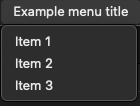I'm trying to create a simple menu bar extra in Swift UI using the new MenuBarExtra. I would like the button text in the popover to update dynamically every time the menu is open.
I'm creating the MenuBarExtra like this.
MenuBarExtra("Example menu title") {
Button("Item 1") {
}
Button("Item 2") {
}
Button("Item 3") {
}
}
I would like the button text (ie. Item 1) to change every time the menu is open. I would have expected onAppear to fire every time the menu is open, but it only fires the first time. After the initial opening of the popover, there is no clear way to detect a menu close or open event.
I have tried using the various event handling callbacks to detect the popover opening. OnAppear works for detecting the initial creation of the view while onDisappear is notably never called.
MenuBarExtra("Example menu title") {
VStack {
Button("Item 1") {
}
Button("Item 2") {
}
Button("Item 3") {
}
}.onAppear() {
print("This only prints the very first time the menu is opened")
}
}

